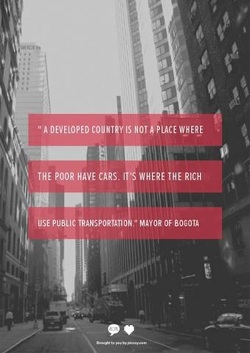 "A developed country is not a place where the poor have cars. It's where the rich use public transportation." If the truth of this statement is not immediately apparent, you probably have never commuted in a West African city. Accra needs a lot of infrastructure improvements, but one thing it does not need are more cars. After work, I can run the two miles to my gym faster than I could take a taxi there. Traffic is similarly bad in Kumasi and Dakar, and is rapidly worsening in Tamale. Driving is no picnic in American cities, either. The difference? In American cities, rich people often choose to live in places accessible to public transportation, and their taxes and patronage support transit systems that benefit the rich and poor alike (even LA is getting on the bandwagon). In developing country cities, the poor take low quality public transit, such as trotros and shared taxis, while the rich clog the roads with their private cars and taxis. While roads in developing country cities could certainly be improved (I would love to see someone apply traffic light efficiency models to Accra traffic), the reality is there is limited capacity to expand current roads or build new ones in the middle of the city. Poor people are already taking public transport. That leaves one viable solution to traffic in developing country cities: getting rich people to convert to public transport. For practical and cultural reasons, this is an uphill battle. First, the main reason rich people use public transport in developed cities is not because they are altruistic, it is because it is faster and easier than driving. Accra currently has no public transit system that can rival the speed and efficiency of a private car. Considerable investment would have to be made in a rail or bus system with widespread coverage and efficiency in order to convince people to convert. Second, there is a cultural attachment to driving. Owning a car is a definitive status symbol in West Africa; taxi drivers are often confused when I, a person who apparently has the money to take a taxi, choose to walk. Improving traffic in Accra will require a commitment from the wealthy and elite-- both foreigners and Ghanaians-- to get out of their air conditioned Toyota Landcruisers and both fund and use public tran
22 Comments
 Bush said, "I know the human being and fish can coexist peacefully." Obama said, "The Interior Department is in charge of salmon while they're in fresh water, but the Commerce Department handles them in when they're in saltwater. I hear it gets even more complicated once they're smoked." As a proud representative of the Pacific Northwest, I demand that my elected officials start taking my fish seriously!
The Washington Post had an interesting article today about the environmental cost of toilet paper, particularly the extra-plush kind Americans love. Apparently, to get that super soft feel, you need to use old growth trees, which have long fibers that result in a smooth paper product. Recycled paper fibers tend to be shorter, and result in a rougher paper product.
Most of the toilet paper in public restrooms, such as those in restaurants, contain recycled material. Very little of the toilet paper consumed by American households does. European households buy much more toilet paper containing recycled material. Much of the world uses no toilet paper at all. The figure I have seen, though couldn't locate in an official source, is that only 30% of the world's population uses toilet paper. As someone who has lived in a country where most of the population doesn't use toilet paper, I can say toilet paper isn't necessarily the method that gets you the cleanest, though in my opinion it is the most convenient. Interestingly, the recession may help sales of recycled toilet paper. Recycled toilet paper is often less expensive than premium, ultra-plush triple-ply stuff. Last spring, the New York Times reported that sales of premium toilet paper had plunged. I urge everyone to consider buying recycled toilet paper: it's one of the few opportunities to go green by spending less. |
About Liz
I have worked in economic policy and research in Washington, D.C. and Ghana. My husband and I recently moved to Guyana, where I am working for the Ministry of Finance. I like riding motorcycle, outdoor sports, foreign currencies, capybaras, and having opinions. Archives
December 2016
Categories
All
|
 RSS Feed
RSS Feed
